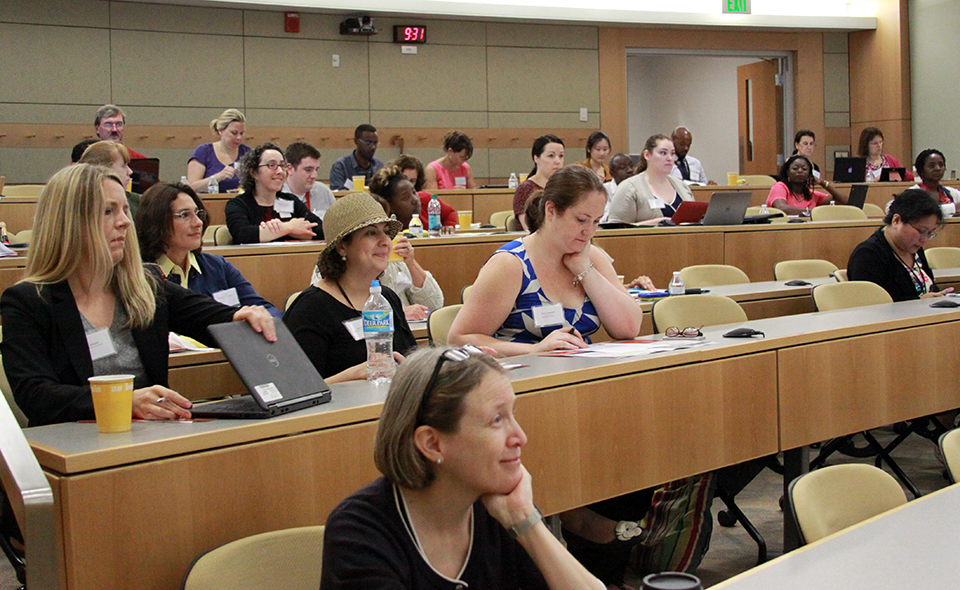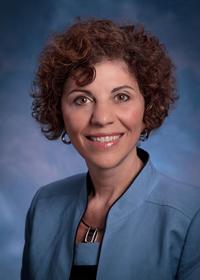School of Pharmacy Hosts UMB’s First CER-PCOR Summer Institute
Week-long workshop featured presentations, panel discussions, and other activities designed to broaden participants’ knowledge of comparative effectiveness research and patient-centered outcomes research.

By Malissa Carroll
September 17, 2015
The University of Maryland School of Pharmacy welcomed researchers, clinicians, policymakers, patient advocates, and students from across the University of Maryland, Baltimore (UMB) and beyond to the University’s first CER-PCOR Summer Institute in August. Organized by UMB’s Patient-Centered Research for Outcomes, Effectiveness, and Measurement (PROEM) Center of Excellence in Comparative Effectiveness and Patient-Centered Outcomes Research, this week-long event offered advanced training to help participants design effective comparative effectiveness research (CER) and patient-centered outcomes research (PCOR) studies, conduct appropriate statistical analyses for those studies, and appropriately interpret and implement the findings from those studies.
“In recent years, a new emphasis has been placed on the need to engage patients in all aspects of health care research, decision making, and dissemination,” said Natalie D. Eddington, PhD, FCP, FAAPS, dean and professor of the School, who welcomed participants to the event. “Patients are becoming empowered to actively participate in research studies as collaborators with input on how studies are designed and what outcomes should be measured. Your presence at the CER-PCOR Summer Institute is evidence that patients matter to you and that what they have to say is important.”
CER compares the effectiveness, benefits, and harms of different medications, medical devices, and medical interventions to help patients and providers make more informed health care decisions. PCOR works to ensure that patients and caregivers’ voices are heard as researchers conduct studies to assess the benefits and harms of existing treatment options for a wide range of illnesses.
“UMB is one of only five institutions to receive funding from the Pharmaceutical Research and Manufacturers of America (PhRMA) Foundation to establish a Center of Excellence in CER-PCOR,” says Eleanor Perfetto, PhD, MS, professor in the Department of Pharmaceutical Health Services Research (PHSR) at the School of Pharmacy and director of the PROEM Center of Excellence in Comparative Effectiveness and Patient-Centered Outcomes Research, who spearheaded efforts to organize the CER-PCOR Summer Institute. “The CER-PCOR Summer Institute offered a unique opportunity for us to showcase UMB faculty members’ expertise in these emerging areas of research. It helped us to further position the University as a leader in these fields and highlighted our ability to serve as a crucial resource for others as they endeavor to incorporate these important areas into their own work.”
Sponsored by the School’s Center for Innovative Pharmacy Solutions (CIPS) Knowledge Enterprise, the Patient-Centered Involvement in Evaluating the Effectiveness of Treatments (PATIENTS) program, the PhRMA Foundation, and the National Pharmaceutical Council (NPC), the CER-PCOR Summer Institute was mirrored after a short course — titled “Introduction to Clinical and Translational Research” — developed by Mary-Claire Roghmann, MD, MS, professor in the Department of Epidemiology and Public Health at the University of Maryland School of Medicine and co-investigator for the PROEM Center of Excellence in Comparative Effectiveness and Patient-Centered Outcomes Research. It provided participants with an introduction to CER-PCOR, as well as the skills and resources required to navigate these specialized areas of research.
“Attending the CER-PCOR Summer Institute was an incredibly enriching experience,” says Diana Saville, Chief Innovation Officer for the Angiogenesis Foundation – a non-profit organization dedicated to helping people lead healthier, longer lives by restoring balance to blood vessel growth. “The presentations and panel discussions allowed me to gain a much deeper understanding of the methods and value of CER-PCOR, while other activities provided terrific opportunities to network with researchers, policymakers, and representatives from patient advocacy groups. I feel ready to apply the concepts that I learned to my work.”
Additional collaborators for the CER-PCOR Summer Institute included the Food and Drug Administration, the National Cancer Institute, the Patient-Centered Outcomes Research Institute, the Lora Group, LLC, PatientsLikeMe, Sanofi, and Pfizer. Presenters from academia, government, and industry addressed topics such as the fundamentals of CER-PCOR, patient engagement, research methods, selecting and measuring health outcomes, and translation, dissemination, and implementation science. They provided valuable insights to help participants better understand how to clearly articulate the methods, findings, implications, and value of CER-PCOR studies; describe current and emerging practices for engaging patients and stakeholders in CER-PCOR; apply research methods to design or assess CER-PCOR studies; engage patients and other stakeholders when identifying relevant outcomes for CER-PCOR studies; and identify appropriate dissemination and implementation strategies to effectively disseminate and implement CER-PCOR findings.
“I appreciated how the CER-PCOR Summer Institute brought together speakers from diverse backgrounds to help attendees better understand the many opportunities available in these emerging areas of research,” says Chukwukadibia Udeze, a second-year student pharmacist at the School of Pharmacy who attended the Institute. “In fact, the most important lesson that I learned was the importance of bringing together stakeholders from different areas to better understand a problem. It is often perplexing when a proposed health care initiative does not have its intended effect. Engaging different stakeholders such as clinicians, researchers, and patients, not only increases the likelihood that an initiative will succeed, but also that, should the initiative not succeed, the reasons will be better understood.”
“The CER-PCOR Summer Institute introduced me to a new way of conducting research,” adds Ilynn Bulatao, a graduate student studying epidemiology and human genetics at the School of Medicine. “Before attending the Summer Institute, the notion of involving patients in the planning and design of a research study seemed farfetched. However, by the end of the week, it became clear to me that the questions that are of interest to researchers may not necessarily be meaningful to patients, and I was left wondering why there aren’t more studies that engage patients at every level of research.”



